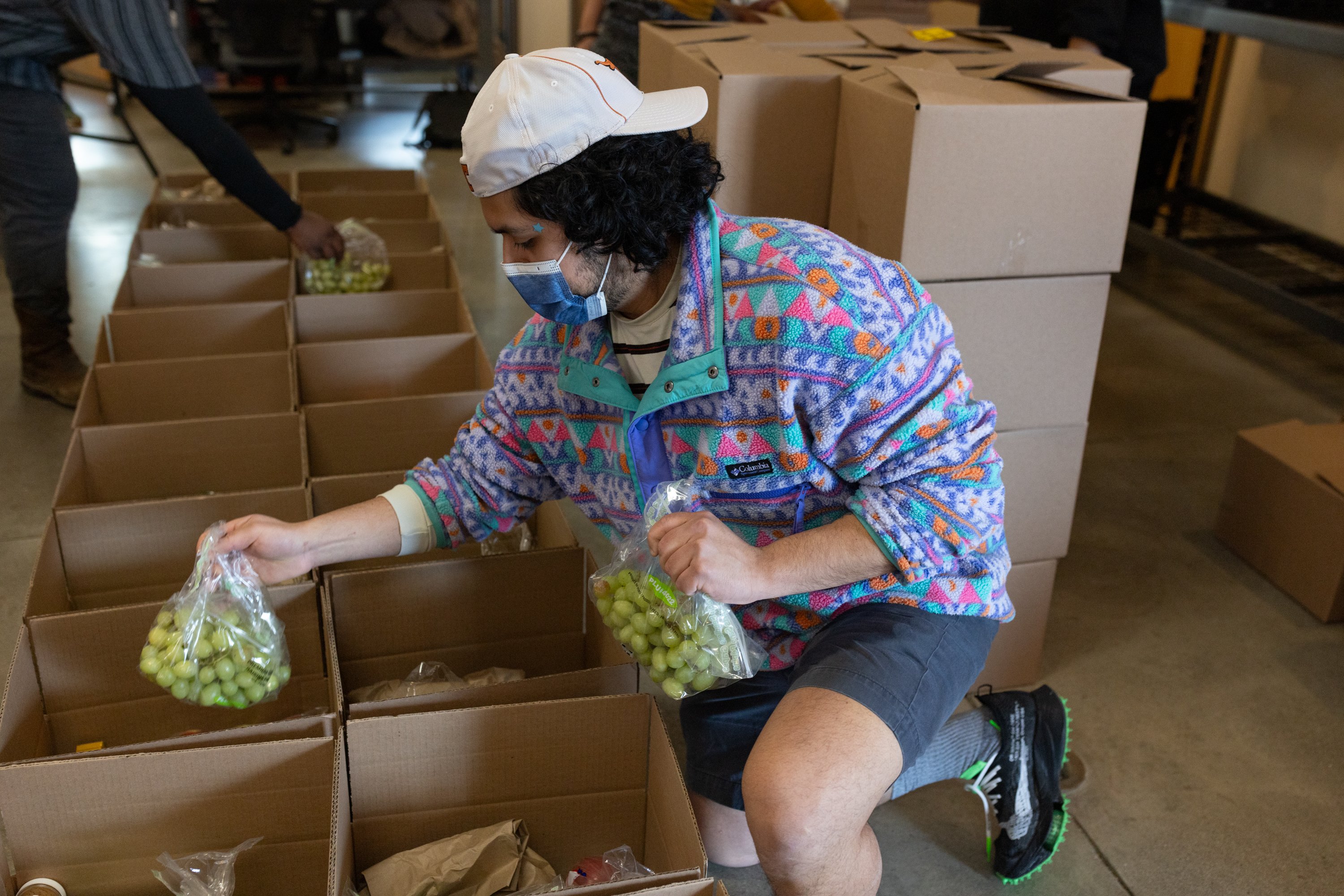
On a sunny Saturday morning on a quiet side street in Portland, Keyko Torres climbed the steps of a duplex and greeted the woman who answered the door. Torres, the community health and wellness director for Presente! Maine, spoke with the woman in Spanish while a volunteer carried over a box of rice, beans, vegetables and other groceries. A few minutes later, Torres and the volunteer hopped back in their truck to head to the next stop and check in on another family.
Keyko Torres, right, the community health and wellness director at Presente! Maine, talks with a client and asks them a few questions after delivering a food box in Portland on March 22. Brianna Soukup/Portland Press Hereald The scene plays out twice a month across Portland, South Portland and Westbrook as volunteer drivers and community health workers drop off food boxes put together by the Portland nonprofit. President Donald Trump’s recent rhetoric on immigrants has left some members of that community feeling unsafe leaving their homes, Presente leaders say, even to get basic necessities like food out of fear of being targeted or detained.

Presente recently switched to door-to-door delivery instead of holding a market-style distribution at its office so the community could access support without fear of gathering in public. “We didn’t want to wait until something bad happened. We want to make sure that we’re considering the safety and security of our community at all times, and that we’re centering any of the delivery and implementation of our programs around what are the needs of the community,” said Executive Director Crystal Cron.
BACK TO DELIVERY Launched at the start of the pandemic to support the immigrant community in the Portland area, Presente has grown from a food brigade that boxed up and delivered food to 50 people in its first week, to a nonprofit that distributes food to hundreds of people every other week with an added focus on increasing access to health care. From left, Grace Abbott, Desiree Vargas and Hugh Piper box food donated by Good Shepherd Food Bank and Wayside Food Programs for delivery to clients of Presente! Maine. Brianna Soukup/Portland Press Herald Most of the people Presente works with are from Central America, Venezuela and Colombia.
Many work in the seafood processing and hospitality industries and have young families. Some are here on visas, or other temporary immigration status, and some are undocumented. For the past several years, Presente has distributed food through its Despensa Solidaria (Solidarity Pantry) program at farmers market-style gatherings, at times in a parking lot on Park Avenue and more recently from its office.
But with the Trump administration’s crackdowns on immigration and increased pace of deportations, some members of Maine’s immigrant community said they no longer felt safe congregating outside and waiting to get into the building to get food, said Cron. So some people stopped showing up altogether. “They weren’t coming to appointments to sign up for health care,” Torres said.
Volunteer Damaris Mayans, left, and Keyko Torres, the community health and wellness director at Presente! Maine, carry food boxes from their truck to a client’s home on March 22. Brianna Soukup/Portland Press Herald Flor Cron, Presente’s food sovereignty lead and Crystal Cron’s sibling, said it has been “devastating for community members to be living in fear.” “No one should be afraid to leave their home to access basic needs,” Flor Cron said.
“It was really beautiful to gather together in one place. That has been lost.” The decision in January to switch back to delivering food brought the organization back to its roots.
The process involves more volunteers than the market-style distributions, but people stepped in to help, said Tophe Thorne, who started as a volunteer in 2020 and now works for Presente. A CRITICAL NEED Crystal Cron had already been working on plans for an organization to better meet the needs of people in her community when the COVID-19 pandemic shutdown started in March 2020. It was immediately clear that many people could not simply afford to stay home from work.
As she talked to people about how to stay safe from the virus, they’d tell her, “What other choice do I have if I don’t work? I’ll die anyway.” “It was like, ‘No more time for planning and talking,'” she said. “Our community needs us now.
” Volunteers and staff at Presente! Maine pack food boxes for delivery. Brianna Soukup/Portland Press Herald Working from Cron’s garage, a contingent of volunteers boxed food they bought wholesale through a local restaurant and delivered groceries to 50 families in its first week. Two weeks later, the food brigade delivered to 250 families.
By the following year, they were delivering 15,000 pounds of food to 2,200 people weekly around Portland, Biddeford and Lewiston. “It came at the right moment because people were so paralyzed and so at a loss of what to do,” Cron said. Presente surveyed the families it was helping and found that for many, the food was not just supplemental, it was the bulk of the food they had access to.
Families also had other needs — diapers, cleaning supplies, basic household items — and Presente delivered those too. “The impact was huge and it was such a critical need,” Cron said. “It really highlighted for us just how bad the situation was that a 25-pound box of food would make such a big difference in their lives.
But people really depended on that and it only continued to grow.” Presente, which now has an annual budget of $1.15 million funded by donations and grants, has expanded to include health equity work, both at the individual and community level.
The organization helps people access health coverage, navigate the health care system, make appointments and advocate for their needs. It also has a 2-acre farm in Androscoggin County where it grows food for community distribution. That land is also a place for people to play and reconnect with the land, Cron said.
Presente operates with the mindset “Solo el pueblo salva al pueblo:” “Only the people save the people .” ‘EVERY WEEK THE LIST GROWS’ Every other Friday, staff and volunteers pick up food ordered through Good Shepherd Food Bank and Wayside Food Programs, which collects and redistributes food to programs across southern Maine, then come back to the Presente office to prepare to make deliveries the following day. All of the volunteers who help with the food distribution are carefully screened.
Many have been involved with the organization for years, while others have signed up recently to support the community. Tophe said Presente now relies on volunteers — including 95 people so far this year — to make sure the community’s basic needs are met. Tophe Thorne, the communications lead at Presente! Maine, packs food boxes in Portland on March 22.
Brianna Soukup/Portland Press Herald On a recent Saturday morning, nearly a dozen volunteers and staff members showed up at the Presente building to fill 112 boxes to be delivered to 395 people — the highest number in the month or so since the organization switched back to delivering food to clients’ doors. They expect that number to grow as community health workers connect with more people, and the clients tell their friends and neighbors. “Every week the list grows,” Torres said.
“The power of the community is word of mouth.” The focus at Presente has always been on providing culturally appropriate food with dignity, Cron said. Typically, the boxes include rice and dried beans, maseca (a fine corn masa flour used to make tortillas and other dishes), fresh produce, protein and other grocery staples.
During the growing season, the boxes will included fresh produce and herbs harvested from Presente’s farm. Volunteers lined up dozens of boxes, then methodically filled them with rice, beans, sweet potatoes, onions, grapes, apples, granola bars, pasta, tomato sauce and small jars of cumin, paprika and oregano. Some boxes got packets of chicken, others a frozen turkey breast.
“Programs like this help them feel empowered and help parents not feel ashamed to feed their children,” said Lili Joseph, a first-time volunteer who was helping out with a group from Jewish Voice for Peace and Jewish Action Maine. When the boxes were full, volunteers loaded them into cars to be delivered on eight routes in Portland, South Portland and Westbrook. On four routes, a community health worker accompanied the volunteers to talk to clients about safety, wellness or other issues.
On her third stop of the afternoon, Torres talked to the woman on her front porch in Portland about her needs and promised to bring her a space heater and fan next month. Presente will also deliver fire safety supplies, along with smoke detectors through a partnership with the American Red Cross. As difficult as it has been to see community members living in fear, Torres sees some positives in moving back to food delivery; it has eliminated the transportation barrier for some families and made it possible for those who couldn’t get to the Presente office to receive food.
It also allows workers to check up on clients in their homes and assess how the organization can support them, she said. “When people are looking at the news and it’s so bleak, it’s easy to feel powerless and hopeless,” Torres said. “It’s important to remember that there are still small ways to help the community.
” Comments are not available on this story. Read more about why we allow commenting on some stories and not on others. We believe it’s important to offer commenting on certain stories as a benefit to our readers.
At its best, our comments sections can be a productive platform for readers to engage with our journalism, offer thoughts on coverage and issues, and drive conversation in a respectful, solutions-based way. It’s a form of open discourse that can be useful to our community, public officials, journalists and others. We do not enable comments on everything — exceptions include most crime stories, and coverage involving personal tragedy or sensitive issues that invite personal attacks instead of thoughtful discussion.
You can read more here about our commenting policy and terms of use . More information is also found on our FAQs . Show less Send questions/comments to the editors.
.











